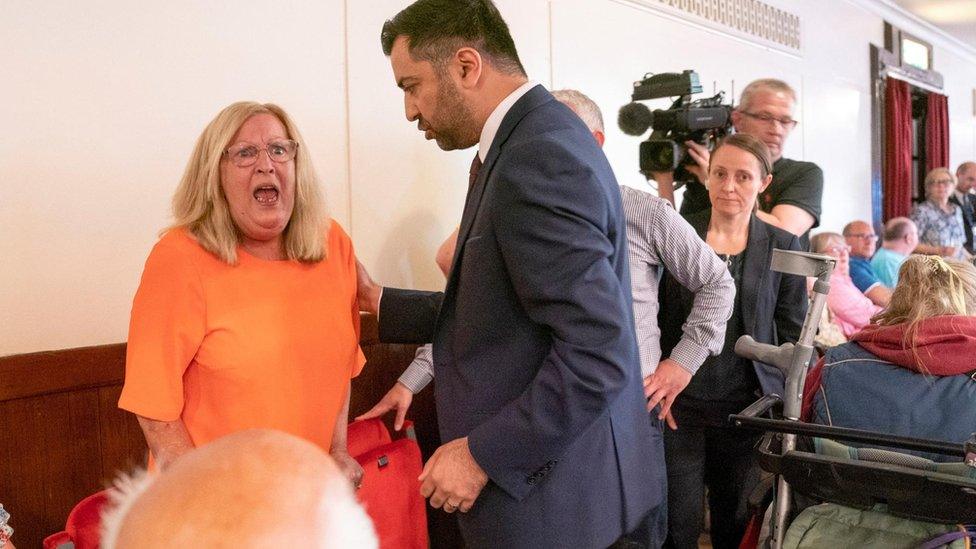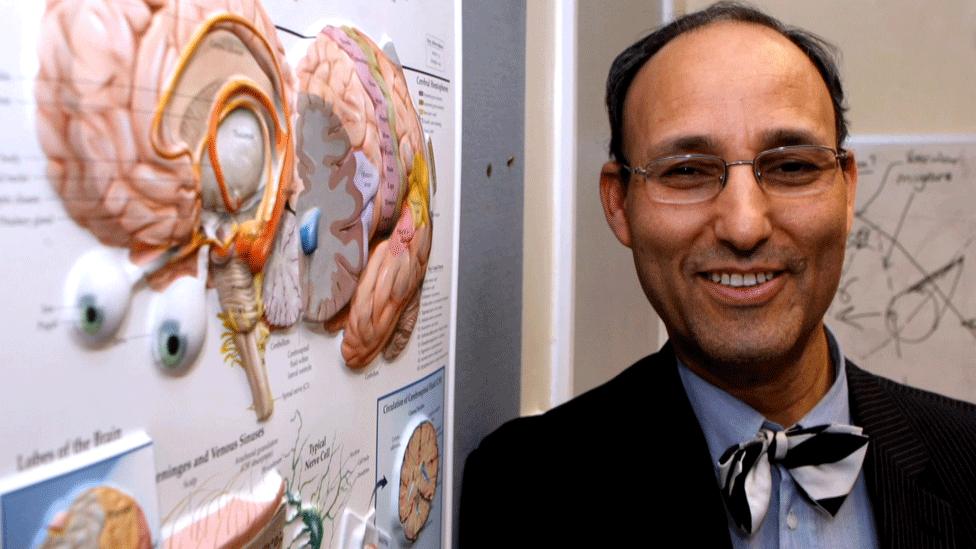Rogue surgeon's patient who heckled Humza Yousaf feels 'let down'
- Published

Humza Yousaf spoke to Theresa Mallett after she heckled him at the event
A patient who heckled First Minister Humza Yousaf during an independence convention says she is "disgusted" by the response to her appeals.
Theresa Mallett, 61, has been left disabled and in constant pain after an operation by rogue surgeon Sam Eljamel.
The first minister spoke to Ms Mallett after she called for a public inquiry - but she has now written to him and NHS Tayside to say she feels "let down".
The Scottish government said it recognised former patients' distress.
Ms Mallett brought the SNP's independence convention to a standstill when she heckled the first minister last month.
Afterwards, she agreed to meet Mr Yousaf at her home in Glenrothes.
Ms Mallett told the BBC he appeared to be listening to her requests for a public inquiry but then wrote her a letter which she says ignored their discussion.
She said she thought that he and the health board had treated her "despicably" and described their response as "so disappointing".
Ms Mallett told the BBC Scotland: "When we met he said a public inquiry was not off the table.
"I said I didn't want an independent review and didn't want to deal with NHS Tayside.
"But after we met I got a phone call from the health board saying the first minister had been in touch with them."

Sam Eljamel was suspended and now works as a surgeon in Libya
Sam Eljamel was the former head of neurosurgery at NHS Tayside and a Scottish government adviser.
Investigations by the BBC found that he had harmed patients for years but been allowed to carry on operating.
At the end of 2013 Mr Eljamel was suspended by the health board and then he was allowed to voluntarily remove himself from the GMC register and avoid any disciplinary action.
He now works as a surgeon in Libya.
Last year a damning report highlighted failures in how NHS Tayside oversaw their head of neurosurgery.
And in April, Health Secretary Michael Matheson said he would launch an independent review of NHS Tayside in relation to the scandal. However, that review has not yet begun.
More than 120 former patients who have been harmed by Eljamel have said publicly that they do not want an independent review and will only accept a full public inquiry that looks at systemic and governance issues.
'No life at all'
Ms Mallett wrote jointly to the health board and the first minister to express her dismay at the way she feels she has been treated.
The grandmother says Mr Yousaf wrote to her suggesting she be part of an independent review of patients - something she and the other patients have already rejected.
She wrote: "I feel let down by you Humza. Disgusted and disappointed.
"This is not a real offer of help. Do you really want me to be reviewed by those who harmed me?"
She says she "has been left with no life at all" and wants a public inquiry to look into systemic problems at the health board,
In the letter, she says she felt the health board "badgered and harassed" her and tried to put words into her mouth when they phoned her - which they told her they did at the first minister's behest.


Obviously everyone in government and beyond has enormous sympathy for Theresa Mallett and the other women harmed by Sam Eljamel.
But they don't want sympathy, they want justice. So the debate here is over the best way to deliver that.
A full-blown public inquiry would have the power - under the 2005 Inquiries Act - to compel witnesses to appear, to have them testify under oath, and to hand over documents and other evidence.
But that power can come at the cost of flexibility. These judge-led proceedings take place within a strict framework, requiring everything from detailed terms of reference to legal representation for core participants at inquiry hearings. They frequently take years, and cost millions of pounds.
An independent review meanwhile could be much more nimble. It may well be able to hand similar conclusions to ministers much more quickly, and at a fraction of the cost - but it would not have the same power to dig into the facts of the case, and its findings might not be seen to carry the same weight.
With the disgraced surgeon unlikely to return from Libya to face the music, Humza Yousaf's argument is that it might be quicker to learn lessons in his absence with an independent review.
But Ms Mallett and others like her also want to see tough questions posed of NHS Tayside - and they believe that can only happen at a full public inquiry.

'End the neglect'
Scottish Labour's Jackie Baillie said it was "a powerful intervention" in the Eljamel saga.
"After months of refusing to hold an independent inquiry, it now seems that the voices and experiences of patients are being shut out," she said.
"This is nothing short of a betrayal of the women involved.
"Humza Yousaf and Michael Matheson must end the neglect of the women failed in this scandal and do what is needed so that their voices are heard."
The Scottish government said the first minister would be replying to Ms Mallett's letter shortly.
A spokesperson said: "He is aware of the seriousness of this issue and has taken a personal interest in finding a solution, including visiting Ms Mallett at her home to hear from her directly.
"We recognise the significant ongoing concern and distress being experienced by former patients of Professor Eljamel.
"When the first minister met Ms Mallett, he outlined that the Scottish government has committed to establishing an independent commission that could engage directly with former patients and deliver answers quicker than a public inquiry would.
"We will provide more detail on the scope of the commission shortly."
NHS Tayside said that it was unable to comment on individual patients due to patient confidentiality.
But it added: "NHS Tayside apologises to former patients of Professor Eljamel and remains committed to do whatever is required to support any independent process which is being set up by Scottish government to respond to the ongoing concerns of these former patients.
"The board continues to work closely with the government regarding these next steps."